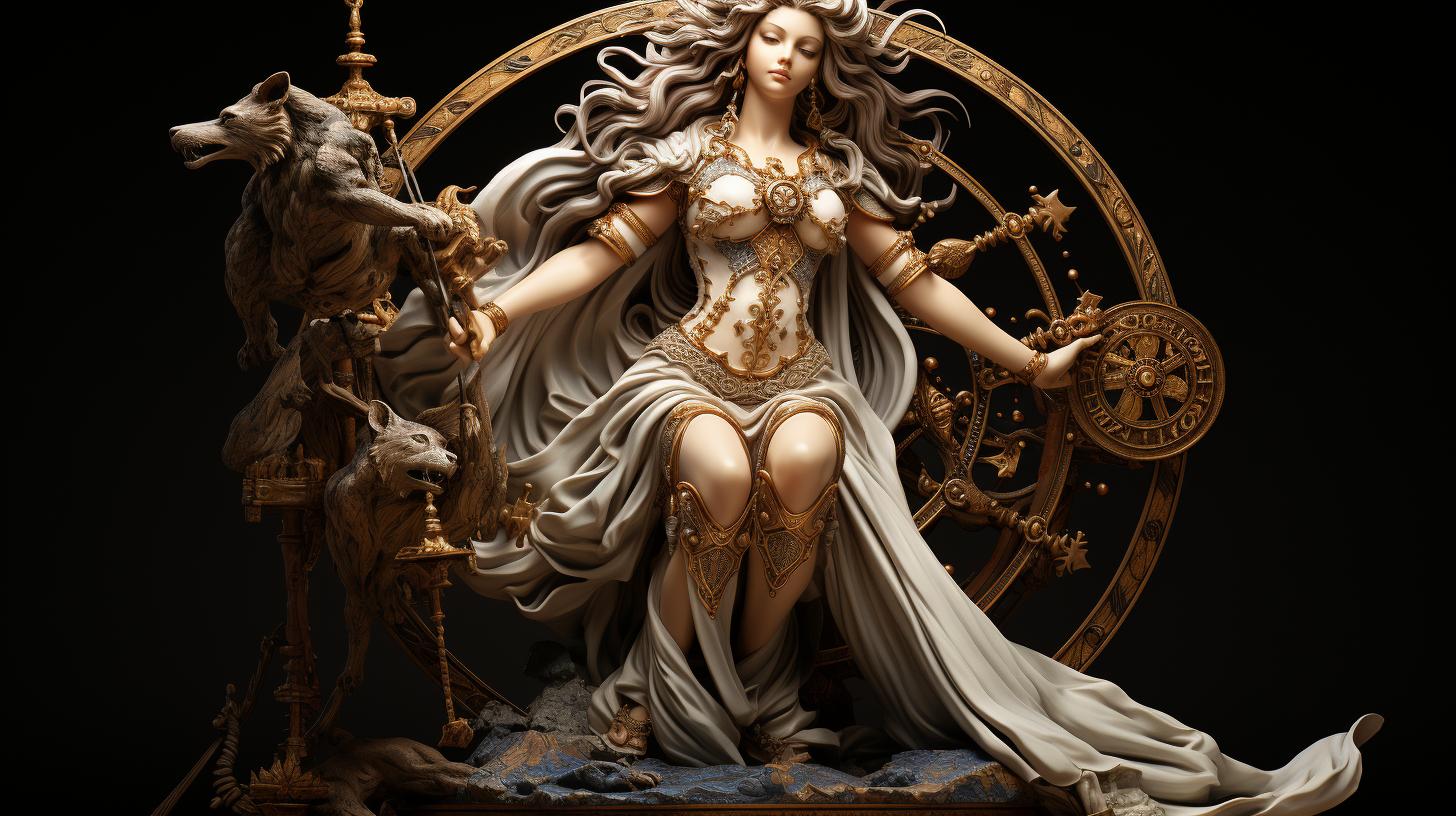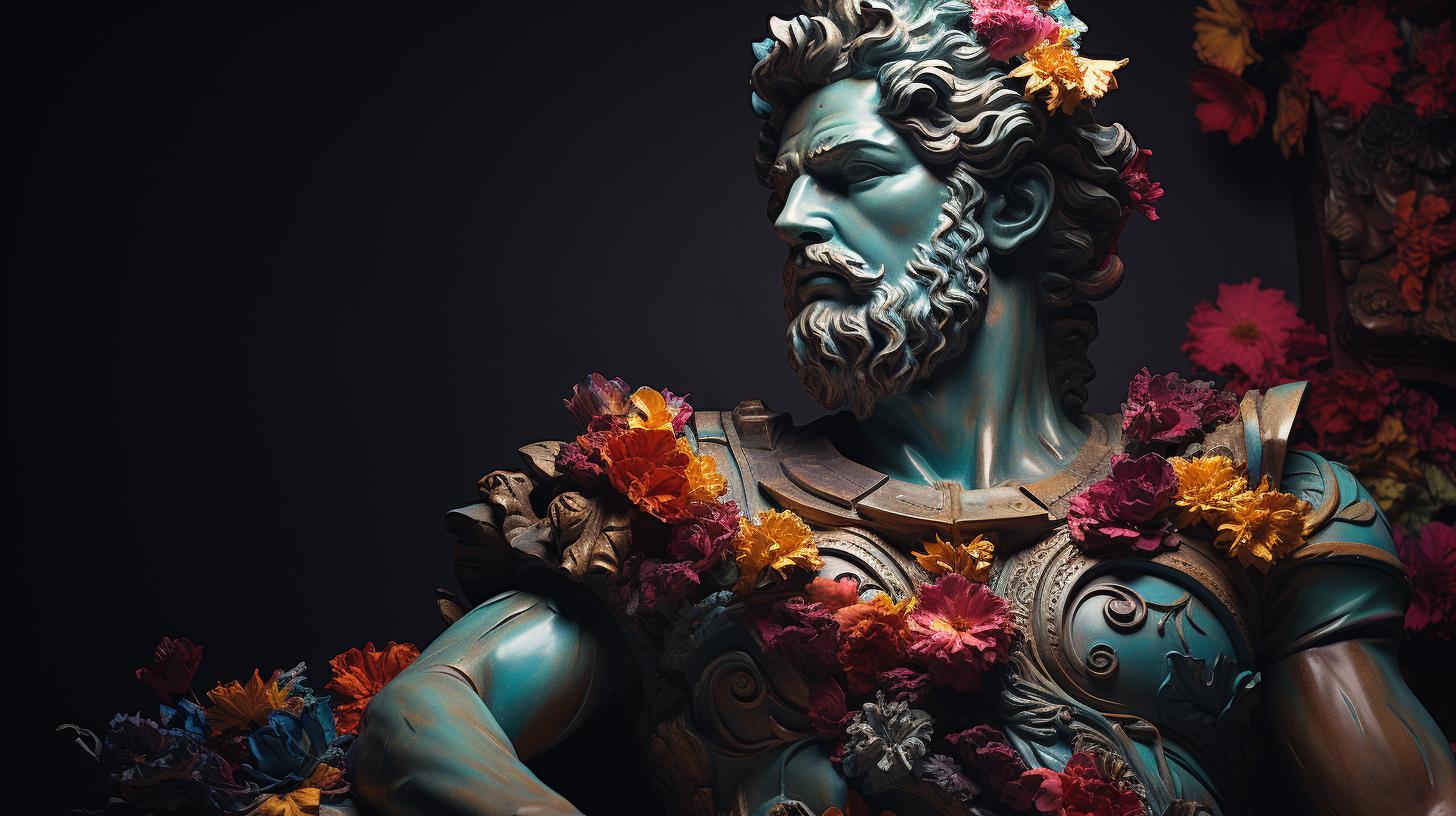Roman Goddess Carmenta: The Divine Protector of Mothers and Inventor of Latin Alphabet

Carmenta, the Roman goddess associated with childbirth, prophecy, and the invention of the Latin alphabet, held a significant role in ancient Roman mythology. As the leader of the Camenae, a group of prophetic water nymphs and goddesses of poetry, Carmenta was revered as a protector of mothers and children.
The Carmentalia Festival, celebrated on January 11th and 15th, honored her with rituals focused on divination and reflection. Let us explore Carmenta’s fascinating influence on Roman culture, her sisters Postvorta and Antevorta, and the evolution of the Latin alphabet stemming from her divine legacy.
The Identity and Roles of Carmenta in Roman Mythology
Carmenta, a revered figure in ancient Roman mythology, played significant roles in the religious and cultural beliefs of the Romans. As a Roman goddess, Carmenta was associated with childbirth, prophecy, and the invention of the Latin alphabet.
She held a special place as a protector of mothers and children and was regarded as the patron goddess of midwives.
Carmenta had a leadership role among the Camenae, a group of water nymphs or prophetic goddesses in ancient Rome. These Camenae were also associated with poetry and presided over springs, wells, and fountains.
Carmenta’s divine influence extended beyond her association with childbirth and prophecy, making her a multifaceted deity who held sway over various aspects of Roman life.
Throughout Roman history, the significance of Carmenta grew due to the high infant mortality rates and the risks associated with childbirth. Worried about the outcome of their pregnancies and deliveries, women sought solace, protection, and guidance from Carmenta.
The Carmentalia Festival, celebrated annually on January 11th and 15th, provided an opportunity for women to perform rituals and seek divine intervention to ensure safe childbirth.
Carmenta’s identity and roles in Roman mythology reflect the deep-seated beliefs and concerns of the ancient Romans surrounding motherhood, fertility, and the mysteries of childbirth. Her association with the development of the Latin alphabet further emphasizes her influence on intellectual and cultural aspects of Roman society.
Carmentalia Festival and its Significance
The Carmentalia Festival, celebrated on January 11th and 15th, holds great importance in Roman culture. This festival is dedicated to honoring Carmenta, the Roman goddess associated with childbirth, prophecy, and the Latin alphabet.
During Carmentalia, pregnant women participate in various rituals to ensure a safe delivery. They offer rice to Carmenta as an offering, seeking her protection and blessings. Additionally, women looking to conceive consume raspberries, as they are believed to enhance fertility.
The festival revolves around divination and reflection on the past. It offers women an opportunity to seek guidance about their future and find solace in Carmenta’s protection amid the risks associated with pregnancy and childbirth in ancient Rome.
Carmentalia also dictates certain prohibitions within sacred Carmenta spaces. It forbids the use of animal skins, respecting the sanctity of the goddess and her significance as a deity closely associated with women and maternal concerns.
Overall, Carmentalia Festival is a significant event that showcases the influence and reverence for Carmenta among the Roman population, particularly pregnant women seeking her guidance and protection during the vulnerable period of childbirth.
Carmenta’s Sisters: Postvorta and Antevorta
In Roman mythology, Carmenta’s importance extended beyond her own divine nature. She was accompanied by two sisters, Postvorta and Antevorta, who played significant roles in the realms of prophecy and childbirth.
Postvorta, meaning “the one that comes after,” was associated with the ability to see into the future. She possessed the power to observe events that were yet to occur, providing insights and guidance to those seeking knowledge of what lay ahead.
Antevorta, on the other hand, represented “the one that comes before.” She was connected to the realm of fertility and foresight regarding the outcomes of pregnancies. Women turned to Antevorta, seeking blessings and protection during the delicate period of carrying a child.
Together, Carmenta, Postvorta, and Antevorta formed a trio of divine sisters, each with her own domain of influence. Their combined presence ensured a comprehensive safeguard for expectant mothers, embracing both the anticipation of new beginnings and the knowledge of what awaited them.
Carmenta’s Influence on Pregnancy and Childbirth in Ancient Rome
In ancient Rome, the mortality rates for both infants and mothers during childbirth were alarmingly high. It was in this context that Carmenta, the Roman goddess associated with childbirth, played a crucial role.
Worshipped as a divine protector, Carmenta offered solace and guidance to women concerned about the outcome of their pregnancies and deliveries.
As a deity connected to prophecy, Carmenta provided reassurance and a glimpse into the future, allowing expectant mothers to seek answers and protection. Her influence extended beyond the spiritual realm, permeating the cultural fabric of Roman society.
The Carmentalia Festival, dedicated to Carmenta, served as a platform for pregnant women to perform rituals aimed at ensuring a safe delivery.
During the festival, pregnant women paid homage to Carmenta by offering rice, symbolizing fertility and abundance. This act was believed to enlist the goddess’s favor and support in facilitating a successful birthing process.
Additionally, women aspiring to conceive partook in the festival by consuming raspberries, which were thought to enhance their fertility.
Carmenta’s presence in ancient Rome consoled women facing the challenges of pregnancy and childbirth, providing them with hope and protection in a time of great uncertainty. Her influential role within the society and her association with the crucial aspects of motherhood and prophecy cemented her position as a revered and essential deity.
Evolution of the Latin Alphabet: A Legacy of Carmenta
Carmenta, the Roman goddess associated with childbirth, prophecy, and the invention of the Latin alphabet, played a significant role in shaping the written language we use today. The Latin alphabet, evolving from the Etruscan alphabet and its Greek version used in Cumas, underwent transformations over the centuries, including the development of lowercase letters during the medieval period.
Carmenta’s influence on the Latin alphabet goes beyond its creation. Her role as a protector of mothers and children, as well as her association with Camenae and water deities, infused the written language with divine inspiration and symbolism.
During Carmentalia, a festival dedicated to honoring Carmenta, women engaged in divination practices and reflected on the past. This festival prohibited the use of animal skins in sacred Carmenta sites, reinforcing her association with life and fertility.
The legacy of Carmenta’s influence on the Latin alphabet extends beyond the boundaries of ancient Rome. Today, the Latin alphabet serves as the foundation for writing various modern European languages, including English, and has influenced alphabets derived from it, such as Vietnamese.
Carmenta’s Association with Camenae and Water Deities
Carmenta, revered as a Roman goddess, held a significant connection with the Camenae, a group of prophetic water deities. As the leader of the Camenae, Carmenta shared their divine realm and influence over springs, wells, and fountains.
Along with her role in childbirth and prophecy, Carmenta possessed a special bond with the poetic arts, further enhancing her association with the Camenae.
The Camenae, revered as nymphs and goddesses, played a crucial role in ancient Rome. They were known for their ability to foretell the future, providing guidance and wisdom to those seeking their insights.
Carmenta’s leadership among the Camenae elevated her status as a divine figure capable of bestowing both prophetic knowledge and poetic inspiration.
The connection between Carmenta and the Camenae underscores the nature of her powers, combining elements of water, prophecy, and artistic creation. This association deepened the reverence and respect given to Carmenta, as she embodied the divine qualities of multiple domains, fostering a rich cultural and spiritual significance in Roman society.
Today, the legacy of Carmenta and her connection with the Camenae continue to intrigue and inspire, serving as a reminder of the ancient Roman beliefs in the interplay of nature, divinity, and human existence.
Common Beliefs and Practices during Carmentalia Festival
The Carmentalia Festival, celebrated on January 11th and 15th, held great significance in ancient Roman culture. It was a time for pregnant women to seek the blessings of Carmenta for a safe and successful childbirth.
During this festival, various practices and beliefs were followed:
- The offering of rice to Carmenta by pregnant women as a symbolic gesture to ensure a smooth delivery.
- Consuming raspberries by those wishing to conceive, as it was believed to enhance fertility.
- Engaging in divination rituals and reflecting on the past for insights into the future.
- Respecting the sacredness of Carmenta’s shrines by prohibiting the use of animal skins.
These customs aimed to seek Carmenta’s guidance and protection during the vulnerable stages of pregnancy and childbirth, which carried significant risks during ancient times.
Influence of Carmenta in Roman Culture and Society
Carmenta, a revered Roman goddess associated with childbirth, prophecy, and the invention of the Latin alphabet, held significant influence within ancient Roman culture and society. Her role as a protector of mothers and children made her an essential deity in a society where maternal and infant mortality rates were high.
Women sought her guidance and protection during pregnancy and childbirth, reflecting their reliance on Carmenta’s divine intervention.
The Carmentalia Festival, dedicated to honoring Carmenta, served as a vital occasion for women to seek answers about their future and find solace in her presence. Through divination practices and rituals, women engaged in deep reflection and sought blessings for safe and successful deliveries.
The festival’s emphasis on divination showcased the societal importance given to Carmenta’s role as a prophetess.
Furthermore, Carmenta’s association as the leader of the Camenae, the prophetic nymphs and water goddesses, further solidified her impact in Roman culture. As patrons of poetry and presiders over springs, wells, and fountains, the Camenae were cherished figures in Roman society.
Carmenta’s leadership among these divine beings amplified her influence and made her an object of reverence and worship.
Carmenta’s connection to the evolution of the Latin alphabet also played a crucial role in shaping Roman culture. The Latin alphabet, derived from earlier systems, became the foundation of written communication in ancient Rome and later influenced numerous European languages.
Carmenta’s role in its creation symbolized her contribution to education, literature, and the spread of knowledge throughout the empire.
In conclusion, Carmenta’s influence in Roman culture and society was multifaceted and profound. As a goddess associated with childbirth, prophecy, and the Latin alphabet, she held a crucial place in the lives of women, offering reassurance and protection during pregnancy and labor.
Her leadership among the Camenae and her connection to the Latin alphabet further underscored her importance within Roman society, making her a revered figure whose legacy endured for centuries.
….




















